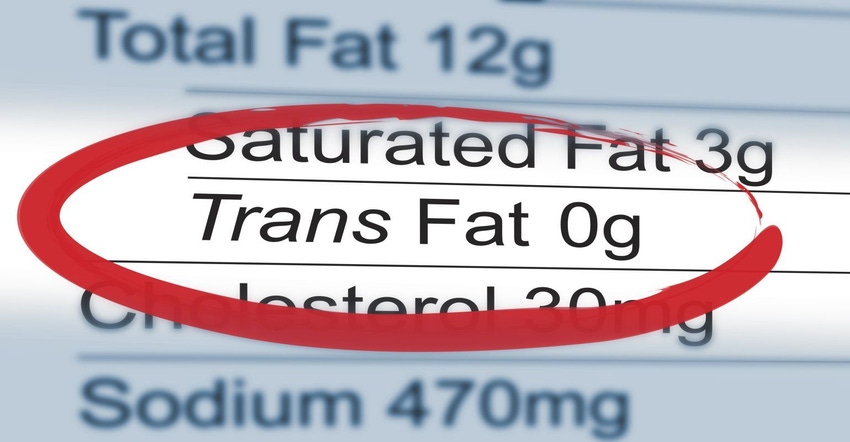On May 7, 12 of the largest global food and beverage companies pledged to enhance their commitment to the World Health Organization’s (WHO) goal of phasing out industrially produced trans fats (iTFAs) from the global food supply by 2023.

The pledge comes one year after the WHO launched an initiative to provide guidance for all countries on how to remove artificial trans fats from their foods, with a view to eradicating the ingredient worldwide. WHO has singled out artificial trans fats as the cause of more than 500,000 deaths from coronary heart disease globally each year.
Trans fats, or partially hydrogenated oils (PHOs), have been vilified for years because they raise LDL cholesterol levels and lower “good” high-density lipoprotein (HDL) cholesterol levels, and have been shown to increase the risk of developing heart disease, stroke and type 2 diabetes. There are two main sources for trans fats: natural (dairy products and meat of ruminants such as cows and sheep) and artificial (partially hydrogenated oils or PHOs). PHOs were first introduced into the food supply in the early 20th century as a replacement for butter, and became more popular in the 1950s through 1970s with the discovery of the negative health impacts of saturated fatty acids. PHOs are primarily used for deep frying and as an ingredient in baked goods and snacks.
Enhanced commitment to rid trans fats
Members of the International Food and Beverage Alliance (IFBA) include The Coca-Cola Co., Danone, Ferrero, General Mills, Grupo Bimbo, Kellogg’s, Mars, Mondelēz International, Nestlé, PepsiCo, Unilever and McDonald’s (which was not part of the 2016 commitment). By the end of 2018, the companies had met the target of their 2016 commitment to reduce trans fats in their products to nutritionally insignificant levels (less than 1 g of fat per 100 g of product) across 98.5 percent of their products worldwide.
This new commitment will align their global standard with WHO’s recommendation for a maximum trans fat threshold in food products not exceeding 2 g of trans fat per 100 g of fat or oil by 2023.
In support of both WHO guidelines recommending a maximum 1 percent total energy intake from all trans fat and an intake of saturated fat not exceeding 10 percent of total energy intake, member companies will try to avoid increasing saturated fat content during reformulation efforts.
“The CEOs of IFBA have made a strong commitment on industrially produced trans fats. This is a demonstration of effective partnerships, leveraging the authority of WHO and the scale and commitment of the private sector for tangible public health outcomes”, said Rocco Renaldi, IFBA Secretary-General. “We hope our commitment inspires our suppliers and partners along the value chain to join us too. We will share our know-how with governments, civil society and the broader industry to ensure that the objective can be met by all food manufacturers in all countries.”
Market research firm GlobalData said the trans fat pledge sets interesting precedent on how ‘food villains’ are tackled. “It is far easier for brands to employ other health-promoting initiatives such as portion control, clear nutritional information and responsible marketing,” said Katrina Diamonon, consumer insights analyst at GlobalData. “However, enacting changes with regard to product ingredients and formulation is an entirely different undertaking. This trans fat pledge may represent a ‘slippery slope’ that brands will need to navigate if WHO continues to crack down on renowned food villains.”
While trans fats are unmistakably linked to a range of harmful outcomes, it is by far the only contributor to dietary-related health problems, GlobalData noted in a press release. As the health impacts of other ingredients such as salt, sugar and saturated fats are increasingly scrutinized, it will be interesting to see how WHO implements similar commitments and, more significantly, how the food and beverage giants respond.
Reformulating considerations
Data from Packaged Facts’ 2017 “Food Formulation Trends: Oils and Fats” report found trans fats are avoided the most (35 percent) by consumers, followed by saturated fats (29 percent), partially hydrogenated oils (PHOs) (24 percent), margarine (21 percent), and vegetable shortening (18 percent).
This heightened demand for healthier fats and oils is impacting all food and beverage categories, and food and beverage manufacturers are turning to clean label fats and oils to appeal to a growing base of health-conscious consumers.
However, the trans fat ban poses significant formulation challenges for technically complex categories such as baked goods, confectionery and nondairy products that rely heavily on the use of PHOs as a replacement for saturated fatty acids. On the bright side, the ban also creates market opportunity for brands to produce innovative products containing healthier fats and oils. The good news is fat and oil technologies are keeping pace with the ever-dynamic needs and preferences of today’s marketplace, and brands are turning to ingredient suppliers for healthier options that don’t compromise taste or function.
About the Author(s)
You May Also Like






.png?width=800&auto=webp&quality=80&disable=upscale)